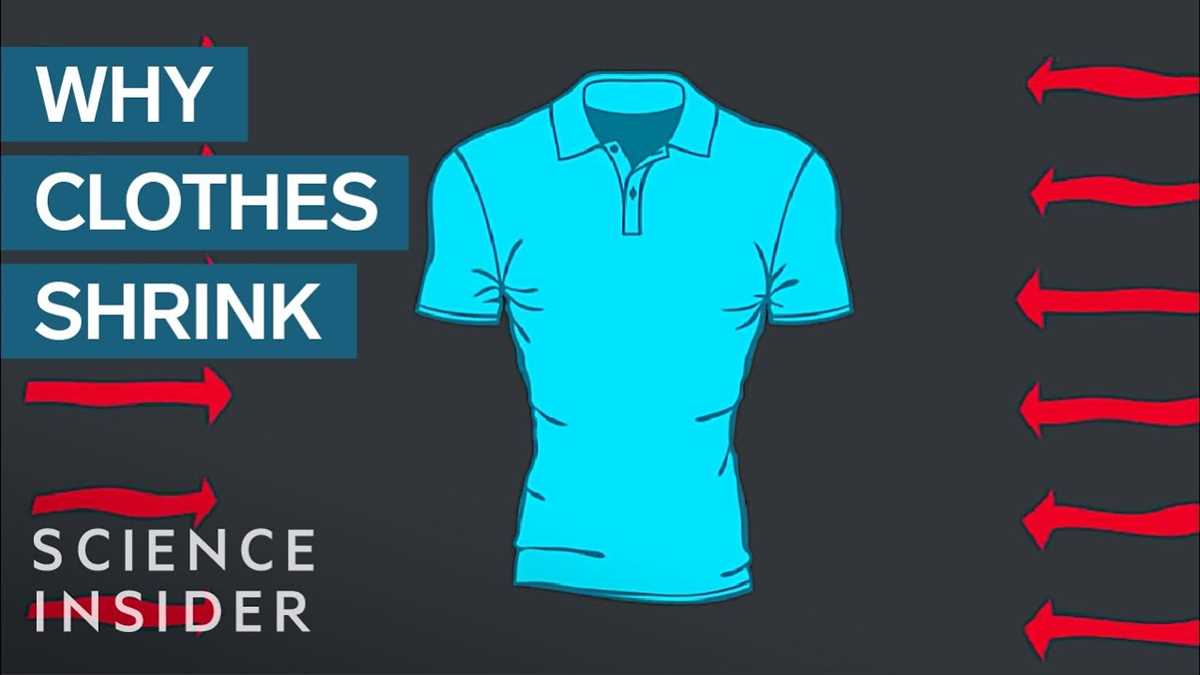


Have you ever had the unfortunate experience of pulling your favorite shirt out of the washing machine, only to find that it has shrunk to an unwearable size? Many of us have encountered this frustrating situation, but few understand the science behind why it happens.
When we throw our clothes into the wash, we expose them to a combination of heat, water, and agitation. These elements work together to break down the fibers in our clothes and cause them to shrink. Heat, in particular, is a major culprit. When clothes are subjected to hot water and high heat in the drying process, the fibers contract and become tighter, resulting in a shrinkage of the overall garment.
Another factor that contributes to shrinking clothes is mechanical agitation. As the washing machine agitates the clothes, it causes the fibers to rub against one another, creating friction. This friction weakens the fibers and can lead to shrinkage, especially if the garment is made from natural fibers like cotton or wool.
One of the most important things to keep in mind when it comes to avoiding shrinkage is to read the care instructions on the clothing label. Many garments will have specific guidelines for machine washing, including recommendations for water temperature and drying method. By following these instructions, you can minimize the risk of your clothes shrinking in the wash.
In conclusion, understanding the science behind clothes shrinking in the wash can help us take better care of our garments. By being mindful of the heat, water, and agitation our clothes are exposed to, and following the care instructions provided, we can ensure that our favorite pieces stay in good shape and avoid the frustration of unexpected shrinkage.
The Role of Heat and Water in Clothes Shrinking
When it comes to clothes shrinking in the wash, the combination of heat and water plays a significant role. Understanding how heat and water affect fabrics can help you prevent shrinking and preserve the lifespan of your clothes.
Effects of Heat
Heat can cause the fibers in your clothes to contract, leading to shrinkage. When exposed to heat, the intermolecular bonds between the fibers loosen, allowing them to move closer together. This can result in a reduction in the overall size of the garment.
Clothes made from natural fibers, such as cotton and wool, are particularly susceptible to heat-induced shrinkage. These fibers have a certain level of elasticity, which allows them to expand and contract. When heated, these fibers lose their elasticity, making them more prone to shrinking.
Effects of Water
Water can also contribute to clothes shrinking. When clothes get wet, the fibers absorb the moisture and swell, which can cause them to shrink when dried.
Just like heat, the type of fabric plays a significant role in how much water affects the shrinkage process. Natural fibers tend to absorb more water compared to synthetic ones, which makes them more likely to shrink when exposed to water.
Combination of Heat and Water
When you combine both heat and water, the shrinking process can be intensified. As the garment absorbs water and is exposed to heat in the washing and drying cycles, the fibers contract even further, resulting in more noticeable shrinkage.
High temperatures and long drying times can exacerbate the effects, so it’s important to follow the care instructions on your clothing labels and avoid using hot water and high heat settings when washing and drying your clothes.
Effect of Friction and Agitation on Clothes Shrinking

Friction and agitation are two factors that play a significant role in causing clothes to shrink in the wash. The combination of these two forces can cause the fabric fibers to compress, resulting in a reduction in overall size. Understanding how friction and agitation affect clothes during the washing process can help in preventing or minimizing shrinkage.
Friction
Friction occurs when two surfaces rub against each other. In the context of washing clothes, friction is created by the movement of clothes against each other, as well as against the walls of the washing machine drum. This friction causes the fabric fibers to rub against each other, leading to a more compact structure.
When fabric fibers rub against each other, they create heat, which can cause the fibers to soften and lose their original shape. Additionally, the friction can also cause the fibers to break or wear down, making the fabric thinner and more prone to shrinkage.
Furthermore, the type of fabric can also impact the level of friction and shrinkage. Fabrics with longer and more resilient fibers, such as cotton and linen, are generally more resistant to friction and shrinkage compared to fabrics with shorter fibers, such as wool or synthetic materials.
Agitation
Agitation refers to the movement of clothes within the washing machine during the wash cycle. The constant tumbling and spinning of the clothes create a mechanical force that contributes to the shrinkage process.
During agitation, the fabric fibers are continuously pulled and stretched in various directions. This stretching can cause the fibers to lose their original structure and become more tightly packed together, resulting in shrinkage.
Agitation can also lead to the deformation of certain types of fabrics, particularly those that are more delicate or prone to shrinking. The constant movement and pressure can cause fabric fibers to disintegrate or warp, forcing the clothes to take on a smaller size.
Preventing or Minimizing Shrinkage

While it may be difficult to completely eliminate shrinkage, there are strategies that can help prevent or minimize it.
- Sort clothes based on fabric type and washing recommendations. This can help ensure that fabrics with similar shrinking tendencies are washed together.
- Use the appropriate washing cycle and temperature recommended for the fabric. Lower temperatures and gentler cycles can help reduce friction and agitation, thus minimizing shrinkage.
- Avoid overloading the washing machine, as this can lead to increased friction and agitation.
- Air drying clothes instead of using a dryer can also help minimize shrinkage, as the heat and mechanical action of the dryer can exacerbate the shrinking process.
- If clothes do shrink, gently stretching them while damp can sometimes help restore their original shape.
By understanding the effects of friction and agitation on clothes during the washing process, you can take the necessary precautions to prevent or minimize shrinkage, allowing your clothes to maintain their original size and shape for longer.
Understanding the Impact of Detergents and Chemicals on Clothes Shrinking
Detergents and chemicals play a significant role in the shrinking of clothes during the washing process. Understanding how these substances can affect the size and fit of our garments is essential for preserving their quality and prolonging their lifespan.
1. Aggressive Detergents

Many detergents on the market contain aggressive chemicals that can cause clothes to shrink. These detergents often have high alkaline levels, which can weaken the fibers of the fabric and cause them to contract. When the fabric contracts, your clothes become smaller, resulting in shrinkage.
2. Harsh Chemical Reactions
Some fabrics, such as wool and silk, are especially susceptible to shrinking due to harsh chemical reactions with certain detergents. These fabrics have delicate fibers that can be easily damaged by aggressive chemicals, causing them to shrink and lose their original shape. It is important to use mild detergents specifically designed for delicate fabrics to avoid this issue.
3. Hot Water
Washing clothes in hot water can also contribute to shrinkage. Heat can cause the fibers of the fabric to contract, resulting in a smaller size. Always check the care instructions on the garment’s label to determine the recommended water temperature for washing. Using cold or warm water can help minimize the risk of shrinkage.
4. Over-Drying
Over-drying clothes in high heat can cause them to shrink. The heat from the dryer can cause the fibers to contract and become smaller, resulting in shrinkage. To prevent this, remove the clothes from the dryer while they are still slightly damp and allow them to air dry the rest of the way.
5. Fabric Blends

Clothes made from fabric blends are more susceptible to shrinking. When different fabrics are blended together, they may have different shrinkage rates. One fabric may shrink more than the other, causing the garment to become misshapen or smaller overall. It is important to follow the care instructions for each fabric in the blend to minimize shrinkage.
6. Pre-Washing
To prevent excessive shrinkage, it is recommended to pre-wash new clothes before wearing them. Pre-washing helps to remove any potential shrinkage-inducing chemicals that may be present in the fabric. It also allows the fabric to undergo its initial shrinkage process before you start wearing the garment regularly.
7. Taking Precautions
To minimize shrinkage caused by detergents and chemicals, it is important to take certain precautions. Some of these precautions include:
- Using mild detergents specifically designed for delicate fabrics.
- Washing clothes in cold or warm water instead of hot water.
- Avoiding over-drying and removing clothes from the dryer while slightly damp.
- Following the care instructions on the garment’s label.
- Separating clothes by fabric type to prevent shrinkage caused by fabric blends.
By understanding the impact that detergents and chemicals can have on clothes shrinking, you can take the necessary steps to preserve the size and fit of your garments and extend their lifespan.
The Role of Fabric Composition in Clothes Shrinking
The composition of the fabric plays a significant role in determining whether or not clothes will shrink in the wash. Different fabrics have different properties that can affect their susceptibility to shrinkage. Here are some key factors to consider:
- Natural Fibers: Fabrics made from natural fibers, such as cotton, wool, or silk, are more prone to shrinking compared to synthetic fibers. Natural fibers have a tendency to absorb water, and when they are exposed to heat or agitation in the wash, the fibers can contract and cause the fabric to shrink.
- Synthetic Fibers: Fabrics made from man-made fibers like polyester or nylon are less likely to shrink in the wash. Synthetic fibers have a lower water absorption rate and are more resistant to heat and agitation. This makes them more resilient and less likely to undergo significant shrinkage.
- Blend of Fibers: Many fabrics are composed of a blend of natural and synthetic fibers. The proportion of each type of fiber in the fabric blend can impact its susceptibility to shrinking. Fabrics with a higher percentage of natural fibers are more likely to shrink, while those with a higher percentage of synthetic fibers are less likely to shrink.
- Fabric Construction: The way the fabric is constructed can also affect its tendency to shrink. Fabrics with a looser weave or knit structure are generally more prone to shrinkage compared to fabrics with a tight or dense structure. This is because the fibers in a loose structure have more room to contract and cause the fabric to shrink.
It’s important to check the fabric composition label of your clothes before washing them to determine their susceptibility to shrinkage. Following the care instructions provided by the manufacturer can help minimize the risk of shrinkage and preserve the original fit and size of your garments.
| Fabric Type | Susceptibility to Shrinking |
|---|---|
| Natural Fibers | High |
| Synthetic Fibers | Low |
| Blend of Natural and Synthetic Fibers | Ranges from high to low depending on the proportion of fibers |
Preventing Clothes from Shrinking: Tips and Advice
1. Read the Care Labels

One of the most important things you can do to prevent clothes from shrinking is to carefully read and follow the care labels on your garments. These labels provide specific instructions on how to wash and dry each item, including the appropriate water temperature and drying method.
2. Sort Your Laundry
Sort your laundry according to color and fabric type before washing. This helps to prevent color bleeding and reduces the risk of clothes shrinking. Delicate fabrics, such as wool or silk, should be washed separately from heavier fabrics, like denim or towels.
3. Use Cold Water
When washing your clothes, opt for cold water instead of hot or warm water. Hot water can cause fabrics to shrink, while cold water helps to preserve their size and shape. Additionally, cold water is more energy-efficient, saving you money on your utility bills.
4. Avoid the Dryer
The heat from the dryer is a leading cause of clothes shrinking. To prevent this, hang your clothes to dry or lay them flat on a clean towel. Air drying not only helps to preserve the size and shape of your garments but also reduces the risk of wrinkles and prolongs their lifespan.
5. Use Gentle Detergents
Choose a gentle detergent specifically designed for delicate fabrics or wool. Harsh detergents can damage the fibers and increase the likelihood of clothes shrinking. Look for detergents that are labeled as “gentle” or “suitable for wool” to ensure the best results.
6. Don’t Overload the Washing Machine
Avoid overloading your washing machine as it can cause excessive friction and stretching, leading to clothes shrinking. Follow the manufacturer’s recommendations for load capacity to ensure that your garments have enough room to move freely during the wash cycle.
7. Take Proper Care of Wool and Delicate Fabrics
Wool and delicate fabrics require special care to prevent shrinking. Hand wash or machine wash them on a delicate cycle with cold water. Instead of wringing or twisting the garments, gently squeeze out the water, and reshape them while damp.
8. Invest in Mesh Laundry Bags
Mesh laundry bags can protect your clothes from excessive friction and stretching during the washing and drying process. Place delicate or small items, such as bras or socks, inside mesh bags to prevent them from tangling with other garments and potentially shrinking.
9. Check the Garment’s Fit
If you notice that a garment is already too snug or tight before washing, avoid the risk of shrinking by correctly sizing up when purchasing new clothes. Additionally, try gently stretching and reshaping the garment after washing to help restore its original size and fit.
10. Regularly Maintain Your Washing Machine
Regular maintenance of your washing machine can help prevent clothes from shrinking and maintain its efficiency. Clean the drum and filters regularly, and check for any signs of damage or wear that may affect the performance of the machine.
Conclusion
By following these tips and advice, you can significantly reduce the risk of clothes shrinking in the wash. Remember to always read and follow the care instructions on your garments, sort your laundry properly, and avoid using hot water and dryers when possible. Taking proper care of your clothes will ensure they stay in great condition and last longer.
FAQ
Why do clothes shrink in the wash?
Clothes can shrink in the wash due to a few factors. Firstly, the agitation and movement of the washing machine can cause the fibers in the fabric to shrink. Secondly, exposure to heat during the washing process can also contribute to shrinking. Finally, some fabrics, such as cotton, are more prone to shrinking than others.
Can all types of fabric shrink in the wash?
While most fabrics can shrink to some extent, not all fabrics shrink in the wash. Natural fibers like cotton, linen, and wool tend to shrink more easily, while synthetic fabrics like polyester and nylon are less likely to shrink. It’s important to check the care label on your clothes to see if they are prone to shrinkage.
Is there anything I can do to prevent clothes from shrinking in the wash?
There are a few steps you can take to minimize the risk of clothes shrinking in the wash. Firstly, you can wash your clothes in cold water instead of hot or warm water, as cold water is less likely to cause shrinking. Additionally, you can try using a gentle or delicate cycle on your washing machine, which will reduce the agitation and movement that can lead to shrinking. Finally, you can also air dry your clothes instead of using a dryer, as the heat from the dryer can contribute to shrinking.
What should I do if my clothes shrink in the wash?
If your clothes have shrunk in the wash, there are a few steps you can take to try and restore their original size. Firstly, you can try soaking the clothes in lukewarm water with a small amount of hair conditioner, as this can help relax the fibers and loosen the tightness. After soaking, gently stretch the clothes back to their original shape and lay them flat to dry. If the clothes are still too small, it may be difficult to completely restore their original size.











